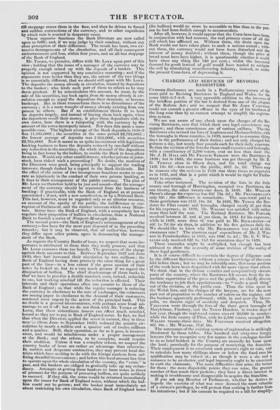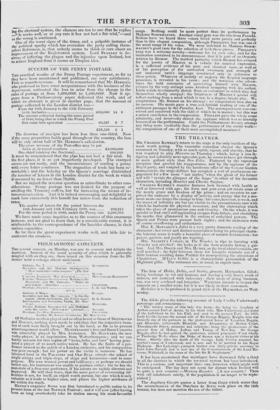CHARGES AND SERVICES OF REVISING BARRISTERS.
Comma disclosures are made in a Parliamentary return of the sums paid to Revising Barristers in England and Wales, for the years 1835-6-7-8-9. A very agreeable addition to the incomes of the briefless portion of the bar is derived.from one of the plagues of the Reform Act ; and we suspect that 'Sir JOHN CAMPBELL could not commit a greater offence in the eyes of his brethren of the long robe than by an earnest attempt to simplify the registra- tion system.
We are not aware of any check upon the charges of the Re- vising Barristers, save that which their own legal consciences may suggest ; and these consciences are of various calibres. The two Barristers who revised the lists of Anglesea and Merionethshire, with the boroughs in those counties, in 1839, managed to consume thirty days in the performance of their duties; and not only charged five guineas a day, but nearly four pounds each for their daily expenses. So that the revision of the lists for those small counties anclboroughs, with a constituency of 2,200 voters, cost no less than 544/. 19s. Mr. J. H. HALL and Mr. FRANCIS BARLOW were the Barristers in 1839; but in 1835; the same business was got through by Mr. R. G. TEMPLE alone in fifteen days, and his total charge was 143/. 13s. 6d.—less cost to the public, 401/. 5s. Gd. There may be reasons why the-revision in 1839 was three times as expensive as in 1835, and that is a point which it would be right for Parlia- ment to ascertain.
Take other instances. The revision of the lists in the little county and borough of Huntingdon, occupied two Barristers, the
• one twenty, the other twenty-one days, in 1839. Mr. WILLIAM .1Ivrees-charge-foteeepenees was 611- 13s. od.; Mr. PRENDERGAST'S only 39/.: the difference is remarkable. The sum-total paid to these gentlemen was 315/. 188. 5d. In 1835, Mr. YONGE the Bar- rister for Flint county and boroughs, charged nearly 4/. per diem for his. expenses; in 1839, Mr. WELsny was satisfied with rather more than halt' the sum. Time Rutland Barrister, Mr. PARKER, received 'between 3/. and 44. per diem, in 1835, for his expenses; while in 1839, more than 6/. was paid to Mr. RICHARDSON—or 40/. Is. 7d. for six days, in addition to his five guineas daily fee. We should like to know why Mr. RICHARDSON was paid at this enormous rate ? The nineteen nays' expenditure of' Mr. J. Wu: sox' in Pembrokeshire, in 1835, was 108/. Is. 4d. ; Mr. E. V. Wu; x.rAms only received 62/. 8s. Ild, for seventeen days' in 1839.
These examples might be multiplied, but enough has been adduced to show the necessity of some revision of the outlay of these legal gentlemen.
It is of' course difficult to ascertain the degree of diligence. used by the different Barristers, without a minute knowledge of the cases laid before them ; but we may be tolerably sure, that some portions of the work have been despatched with far more vigour than others. We think that in the distant counties and comparatively obscure parts of the country, where the Barristers felt secure from the im-
mediate supervision of the press and the public, we chiefly discern the tendency to job their appointments—to " make a good thing" out of the revision, at the public cost. Thus the time spent on the Welsh lists, and the charges of the lawyers, are for the most part out of proportion to the number of voters on the register, and the business apparently performed ; while in and near the Metro-
polis, we discern signs of assiduity and despatch. Thus, Mr. FALCONER went through the lists of the three great boroughs of Marylebone, Finsbury, and the Tower Hamlets, in twelve days of last year, though the registered voters exceed 20,000 in number; while the little county of Flint, with its 2,500 voters, occupied Mr. WELSBY twenty-three days. Mr. FALCONER received altogether, 86/. 10s. ; Mr. WELsity, 1741. 16s.
The annoyance of the existing system of registration is strikingly illustrated by these tables. One hundred and sixty-two hungry lawyers (for we recognize very few names in the catalogue familiar to us as brief-holders in the Courts) are annually let loose upon the land ; practically for the purpose of restricting the franchise. Their employment is to scrutinize each person's right to vote, and to 'calculate how many shillings above or below the fixed suns his qualification may be valued at ; as though it • were a sin and a nuisance to be an elector, and legal ingenuity ought to be exercised to curb the claimants. The more difficulties that arise, the better for them : the more disputable points they can raise, the greater number of fees reach their pockets ; they have .a direct interest in making it troublesome and disagreeable to acquire the franchise. If you ask any Member of Parliament, whether he desires to impede the exercise of what was once deemed the most valuable of a citizen's privileges, lie will protest that nothing is further from his intentions; but if his consent be required to a bill for simplify- ing the electoral system, the chances are ten to one that he replies It works well, or at any rate it has not had a fair trial,"—and so the wrong is continued.
One of the worst signs of the times, and a palpable instance of the political apathy which has overtaken the party calling them- selves Refbrmers, is, that. nobody seems to think or care about an improvement of the Registration system. Lord STANLEY is de- sirous of inflicting the plague and the injustice upon Ireland, but to relieve England from it seems an Utopian idea.



























 Previous page
Previous page